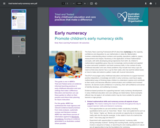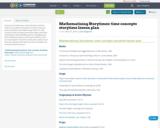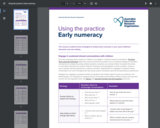
The Early Years Learning Framework (EYLF) describes numeracy as the capacity, confidence and disposition to use mathematics in daily life. Mathematics involves understanding about numbers and quantity, operations, patterns, space, measurement and shapes. Numeracy is the application of these mathematical concepts, with skills developing along trajectories from birth. As children’s mathematical capabilities grow, they are increasingly communicated and applied to solve real-world ‘problems’ and build numeracy skills. In the context of early childhood education and care, these problems may include how many cups we need so that every learner has a cup for their water, who has built the tallest tower, or how to make and extend a pattern made with musical instruments.
Evidence-based practices for supporting learners’ early numeracy development
in early childhood education and care settings are listed. Some examples
offered may not apply in all contexts and/or may be more suitable for particular
learners or age groups.
- Subject:
- Early Childhood Development
- Education
- Material Type:
- Teaching/Learning Strategy
- Provider:
- Australian Education Research Organisation
- Date Added:
- 06/20/2023

